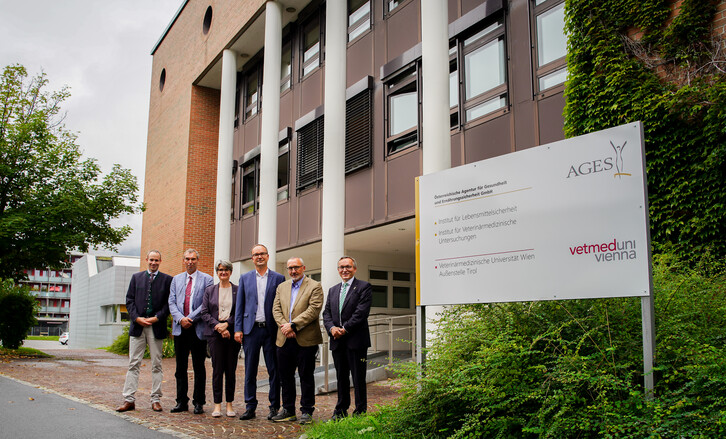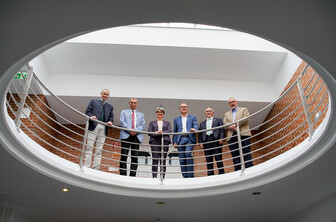Joint focus on infectious diseases in cattle and small ruminants in the Alpine region in teaching, training and research projects has proven successful
"The high animal health status in Austria cannot be taken for granted, but is the result of cooperation between farmers, veterinarians, authorities and science," emphasized AGES Managing Directors Thomas Kickinger and Anton Reinl at a joint press briefing with Petra Winter, Rector of the University of Veterinary Medicine Vienna at the AGES Innsbruck site. Since summer 2020, there has been a close cooperation between the Vetmeduni and AGES regarding teaching, training and research with a focus on infectious diseases in cattle and small ruminants in the Alpine region. "Through our branch office in Tyrol, we are fulfilling our responsibility to make our contribution to securing veterinary care in the Alpine region," Petra Winter emphasized. At the AGES site in Innsbruck, a Vetmeduni branch office on the topic of "The Ruminant in the Alpine Region" was founded as part of its regionalization initiative "VetmedRegio" in order to create a hub between practicing veterinarians in the west of Austria with the AGES as well as the animal health authorities (Provincial Veterinary Directorate, Animal Health Service). The aim is to "experience the profession of large animal practitioners directly with professionals in practice and to be able to accompany diagnostic as well as scientific work of the pathology and laboratory diagnostics experts of AGES," emphasized Michael Dünser, head of the animal health site in Innsbruck. "Together with politics, the profession and local partners, we are facing the challenges of alpine agriculture," Vetmeduni Rector Winter emphasized. Students can deepen their practical training in the ruminant sector and at the same time "establish important contacts for their future professional anchoring in their Tyrolean homeland." Specifically, students who have chosen the "Ruminant Medicine" specialization module in their final year of study spend part of their training in Tyrol. In a varied, practical program, the special features of alpine livestock farming are highlighted, there are excursions to surrounding farms with intensive contact with veterinarians in private practice, as well as specialist lectures by AGES veterinary experts. In addition, diploma theses related to ruminants in the Alpine region are written at the Vetmed site in Innsbruck and dissertation projects are also supervised as part of cooperation projects with AGES, the Tyrolean Animal Health Service and the Provincial Veterinary Authority. "This is more than a taster course in large animal practice," Dünser emphasized, adding that this is "the first time in Austria that the topic of paratuberculosis in small ruminants has been dealt with in a scientifically sound manner." On the part of the AGES the analytics and pathological examinations would be accomplished. Other current dissertations are devoted to the moderate biting disease in sheep and to bovine salmonellosis. The "attractiveness of location and teaching in the west" of Austria is a "win-win situation" for students and animal health institutions like AGES, AGES managing directors Kickinger and Reinl said in unison. In addition to lecture activities and professional exchange, the prospective veterinarians would already get an insight into the cooperation between science and authorities. "In this way, we want to strengthen the trend that two-thirds of our graduates return from Vienna to their home states," emphasized Rector Winter. Michael Dünser understands the cooperation of AGES and Vetmeduni above all also as "support for the training of livestock practitioners", because these would also be urgently needed in the future. The University of Veterinary Medicine Vienna trains veterinarians for Austria. It is therefore an indispensable building block for maintaining the nationwide health of humans and animals in this country. Since its foundation, the AGES veterinary site in Innsbruck has been expanded into a center for infectious diseases in cattle and small ruminants - with further emphasis on parasitoses and wildlife diseases. Students thus have the opportunity to gain practical experience in routine examination activities, for example in pathology during the dissection of a suspected tuberculosis case in red deer. State-of-the-art examination facilities are also available in analytics. In addition to an insight into routine veterinary work, a parasitology alumni project has also been launched at the Vetmeduni Innsbruck site.

